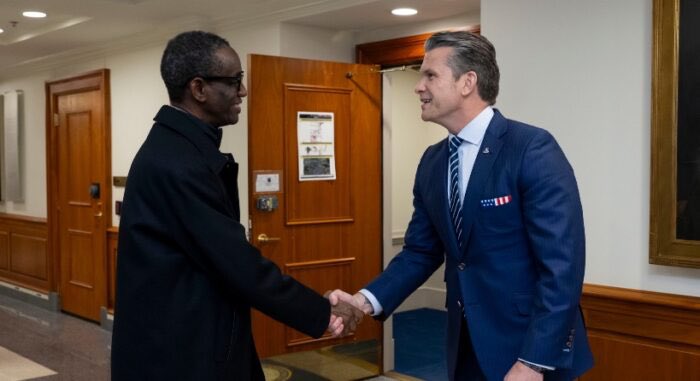The Federal Government of Nigeria has announced that it has reached an agreement with the United States (U.S) to form a joint security group over concerns about Christian genocide in the country.
This joint security group comes despite several rebuttals from the Nigerian government that there is no Christian genocide in the country.
Meanwhile, in a fresh press statement issued by the Special Adviser to the President on Information and Strategy, Bayo Onanuga, the Nigerian government announced that the new collaboration is intended to deepen security ties, provide intelligence support, and expedite the transfer of military equipment to assist Nigeria’s fight against terrorism and violent extremism.
Onanuga, in the statement, added that the agreement on the joint security group was reached after a high-level Nigerian delegation, led by National Security Adviser Nuhu Ribadu, engaged with key U.S. officials, including those from the State Department, Congress, the National Security Council, and the Department of War, to address what they termed as “misconceptions” about the crisis.
Following the engagements, Onanuga said the U.S. Government expressed readiness to expand its security cooperation with Nigeria.
The statement reads: “Discussions and engagements held last week between a high-level Nigerian delegation and US officials will help strengthen security partnerships between the two countries and open new avenues for cooperation to protect Nigerian citizens.
“The delegation, led by the National Security Adviser, Mallam Nuhu Ribadu, met with senior officials across the US Congress, the White House Faith Office, the State Department, the National Security Council, and the Department of War.
“In all engagements in Washington, DC, the Nigerian delegation refuted allegations of genocide in Nigeria, emphasising that violent attacks affect families and communities across religious and ethnic lines. The delegation strongly rejected wrongful framing of the situation, saying such would only divide Nigerians and distort the realities on the ground.
“Following these engagements, the United States Government affirmed its readiness to deepen security cooperation with Nigeria. This includes enhanced intelligence support, expedited processing of defence equipment requests, and the potential provision of excess defence articles—subject to availability—to reinforce ongoing operations against terrorists and violent extremist groups.
“The United States also expressed its willingness to extend complementary support, including humanitarian assistance to affected populations in the Middle Belt and technical support to strengthen early-warning mechanisms.
“Both countries agreed to implement immediately a non-binding cooperation framework and to establish a Joint Working Group to ensure a unified and coordinated approach to the agreed areas of cooperation.
“In return, the Nigerian delegation reaffirmed the government’s commitment to strengthening civilian protection measures.
“The discussions provided ample opportunity to correct misconceptions about Nigeria, forged a constructive, solution-driven partnership with the United States, reinforced mutual trust, and advanced a coordinated approach to protecting vulnerable communities, especially in the Middle Belt.
“The Federal Government restates its awareness of heightened sensitivities regarding religious freedom and security, and urges citizens to remain assured that firm, urgent, and coordinated steps are being taken to secure the nation.
“Members of the delegation included Prince Lateef Olasunkanmi Fagbemi, Attorney General of the Federation; Mr. Kayode Egbetokun, Inspector General of Police; General Olufemi Olatunbosun Oluyede, Chief of Defence Staff; Lt. Gen. Emmanuel Parker Undiandeye, Chief of Defence Intelligence; Ms. Idayat Hassan, Special Adviser to the NSA; and Ambassador Ibrahim Babani, Director of Foreign Relations at the Office of the National Security Adviser.”
The recent development comes after U.S President Donald Trump had earlier this month fired several salvos against Nigeria with claims of an ongoing Christian genocide in the country, which the Nigerian government vehemently denied.
Trump also redesignated Nigeria as a “Country of Particular Concern,” and thereafter threatened military action in Nigeria should the government fail to address the security issues.
Nigerian officials have consistently disputed Trump’s claims, insisting the security crisis is driven by criminality, extremism, and land-related conflicts, not religious persecution. The high-level meetings in Washington were partly aimed at clarifying this position to U.S. policymakers.





